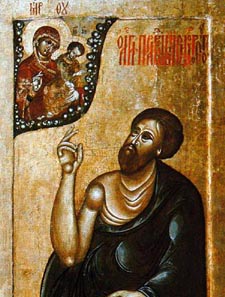|
|||
|---|---|---|---|
| This weekly bulletin insert complements the curriculum published by the Department of Christian Education of the Orthodox Church in America. This and many other Christian Education resources are available at http://dce.oca.org. | |||

The Venerable Isidore, Fool-for-Christ lived in Rostov, a city north of Moscow. This fifteenth-century saint was neither raised in Russia nor in the Orthodox faith. His family lived in Brandenburg, Germany, an area not greatly hospitable to Orthodox Christians. At some point, Isidore moved to Russia, settled in Rostov, and didn't just practice the Orthodox faith but took on one of its most extreme manifestations, serving the Lord as a fool-for-Christ. This meant abandoning the comforts of the prosperous merchant class to which his family belonged. It also meant being an outcast. He was seen every day wandering the streets in rags, thin and unkempt, shouting out warnings against sin or deliberately behaving in foolish ways to call people's attention to their own foolishness. He occasionally rested on a pile of garbage. What people never saw was his constant prayer for them, with only an hour or two of sleep a night to interrupt it. Isidore had built himself a ramshackle hut that offered no protection from the weather, but did hide his ascetical efforts. He knew the danger of praise, and had no intention of letting people see and admire him as a man of prayer. One account of his life says that he went to the home of Prince Vladimir of Rostov on a Sunday and asked a servant for a drink of water. He did so with a specific purpose: he had entreated God to bless Prince Vladimir so that he would govern justly. He had in mind Christ's words: "Whoever gives you a cup of water to drink because you bear the name of Christ, will by no means lose his reward" (Mark 9:41). The servant gave him nothing, haughtily and hurriedly dismissing him. There was no time for beggars, because everyone was busy preparing a special dinner, to which the local archbishop had been invited. As the guests sat down at the table that evening, the butler discovered a serious problem: the wine containers were completely empty. He nervously whispered the bad news into the prince's ear. Prince Vladimir questioned the servants and was told that nothing unusual had happened that day, except for a beggar asking for water. Being a godly man, the prince suspected that the visitor had been the well-known Isidore, and sent a servant to invite him to the house. The servant couldn't find him, but he suddenly appeared in the dining room, offering the archbishop some blessed bread from that morning's Liturgy. A moment later he had vanished, but the wine containers were full to the brim. The prince and his household never again forgot the blessing that offering a cup of water can bestow. In Acts 14: 6-18 we read about a man unable from birth to walk, who is part of the crowd listening to Paul's preaching. This man, too, would probably have been an outcast. But Paul looks "intently" at him, perceives his faith, and miraculously heals him. The outcast may be the very one through whom God works, bringing great blessings to the rest of us. |
|||
